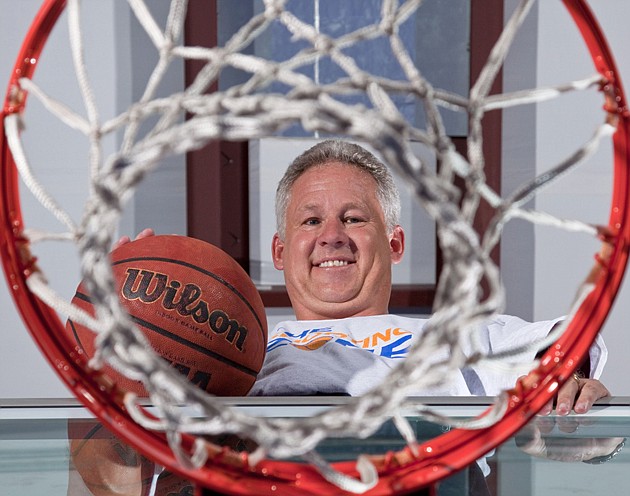- November 24, 2024
-
-
Loading

Loading

All Brett Morrow really wanted was a place to teach his 12-year-old son how to shoot a basketball.
But in the process, he ended up finding a way to put a dent into a growing problem on the Gulf Coast: The amount of empty warehouses and industrial facilities that have multiplied exponentially during the recession.
Morrow, who runs a window sales and installation company, is well aware of the recession's impact on the building products industry. His company, Venice-based Absolute Window & Shutter, had 30 employees, 14 subcontracting teams and worked out of a 28,000-square-foot warehouse during the height of the boom in early 2006. The company was reaching about $1 million in revenues per month.
Absolute Window has since scaled back to less than 10 employees and two or three subcontracting crews. Revenues, not surprisingly, are significantly down.
And while Morrow was guiding his business through the recession this past summer, he was also guiding his son through the rigors of learning how to play and shoot a basketball properly. That led Morrow to want to buy something called the Gun 6000, a large machine that spits out passes across the court at up to 1,000 shots every hour. It costs about $4,500.
Problem was, Morrow had no place to store the contraption. He looked into some schools and churches, but found no takers.
Then Morrow realized the area's vacant properties presented a plethora of storage possibilities.
Moreover, Morrow thought he had the beginnings of a new business: A training center to teach the science of shooting a basketball, something he believes is overlooked in the sport — especially with children and teenagers who spend most of their basketball time in scrimmages and games, without proper shooting instruction.
From there, Morrow launched the Shooting Zone. He found an empty 10,000-square-foot warehouse at the end of a cul-de-sac in a Bradenton industrial park. That was big enough to store a large shooting machine, plus have space left over for a full-size regulation basketball court, training rooms and a few offices.
Morrow says he got a large break on rent from the landlord, who was eager to get a tenant into the space. Morrow then spent $35,000 on turning the warehouse shell into a basketball training Mecca.
“Basketball in our area is a stepchild to football and baseball,” says Morrow, a Pennsylvania native who ran track and played some basketball in high school. “But once parents visit here and see what we do, they become instant fans.”
Morrow has other plans for the Shooting Zone, past just teaching the proper form behind a jump shot. He hopes to hold camps and clinics for all things basketball, as well as rent out the shooting machine to individuals and local youth teams. He will also rent out the gym for adult pickup games.
And, in a nod to harried soccer moms and basketball dads, Morrow has set up a parents waiting station of comfy chairs. The spot even includes a Wi-Fi connection.
Morrow doesn't foresee the basketball business ever becoming bigger than his window and shutter business, even with the economic downturn. But he does envision being able to make a profit someday with the Shooting Zone, in addition to doing something important for the community that's also fun.
Morrow is in good company on the entrepreneurial end of the operation, as the Shooting Zone counts two other prolific entrepreneurs as neighbors: Eric Baird, the Reviews' 2009 Entrepreneur of the Year, runs his $26 million shipping and packaging company, MyUs.com, from a facility across the street. And on the other side of the cul-de-sac is the American Tin Ceiling Co., run by Gary Shaprio, a runner up for the Review Entrepreneur of the Year Award in 2007.